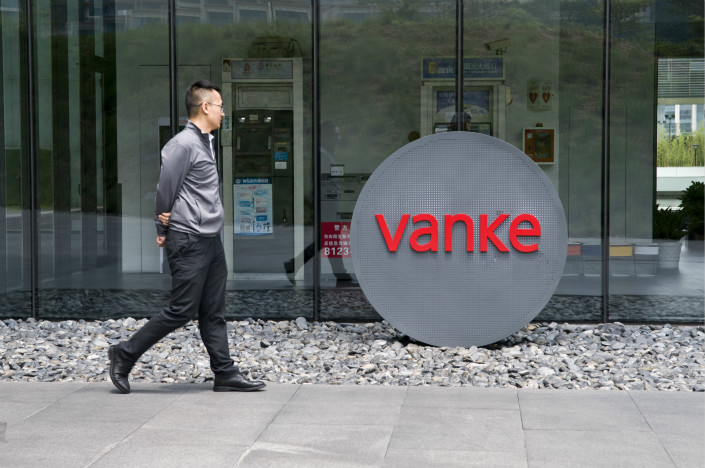Baoneng Unloads More Vanke Stock to Comply With Rules

Corporate raider Baoneng Group unloaded more shares in property developer China Vanke Co. Ltd. as it continued with the forced disposal of part of a stake built up during its failed hostile takeover bid for the house-builder.
Baoneng’s subsidiary, Shenzhen Jushenghua Industrial Development Co., sold 10 million Vanke shares, some 0.09% of its issued share capital, at 27.97 yuan ($4.39) per share through block trades, raising 279.7 million yuan, according to a disclosure (link in Chinese) made to the Shenzhen Stock Exchange after the market closed on Tuesday.
Vanke’s shares fell 1.71% to 28.2 yuan in Shenzhen on Wednesday, reversing a 4.8% jump on Tuesday before the sale was announced, and compared with a 0.17% drop in the Shenzhen Component Index. In Hong Kong, the shares fell 1.85% to HK$30.85 ($3.93) after gaining 4.5% the previous day.
Stock-exchange disclosures show that over the past month, Jushenghua has sold a stake amounting to 1.8% of Vanke’s issued share capital through a series of block trades. Although the investment management company has not made any public announcements about the disposals, market sources told Caixin they are related to the liquidation of nine asset management plans (AMPs) set up by Jushenghua to purchase Vanke shares as part of Baoneng’s hostile bid that dragged on for months until it ultimately failed in 2016.
Jushenghua built up an 18.73% stake in Vanke, one of China’s biggest listed property developer by assets; more than half of that holding, 10.34%, amounting to 1.142 billion shares, was bought with borrowed money raised through the sale of nine AMPs to banks. But the leverage ratio of the AMPs was higher than that allowed in new rules issued by the securities watchdog in July 2016. The regulations also prohibited leveraged AMPs from rolling over their debts and required them to be liquidated on maturity and the underlying assets in the plans sold.
Breach of regulations
Seven of the nine AMPs matured at the end of last year, and the two remaining AMPs will come due in the coming months. But Jushenghua failed to liquidate the plans and sell the Vanke shares, a violation that was highlighted to the CSRC in January by Liu Shuwei, an independent director of the property developer.
Baoneng, which ultimately controls Jushenghua’s stake, responded on Jan. 30 that the subsidiary had signed additional agreements with the related parties to extend the maturity of the plans, although it was unclear for how long. Finally, on April 17, Jushenghua made its first sale, a block trade of 89.72 million shares, a 0.81% stake, for 2.7 billion yuan. Although the disclosure didn’t identify the buyer, Caixin learned the shares were sold to Ping An Securities Co., the insurance subsidiary of Ping An Insurance Group, whose banking unit, Ping An Bank, was one of the lenders involved in the AMPs.
Jushenghua sold another 0.57% stake, 63.47 million shares, for 1.86 billion yuan on April 24 and another 35.9 million shares for 969 million yuan on April 27. The buyers were not identified.
Tuesday’s sale was made in two tranches — one of 4 million shares, and one of 6 million. Caixin learned from market participants that one was bought by Xieyu Chuanzhang Asset Management Co., a Shanghai-based asset manager, and the other by Shanghai Yinli Culture Development Co., a marketing and event-planning company.
The two companies appear to be connected. Data on Qichacha.com, an internet portal that tracks business registration information, shows that some subsidiaries have common shareholders and others have a common executive board member. One of Xieyu Chuanzhang Asset Management’s investors is Shanghai-based private fund Panhou Capital, a company whose services include helping investors reduce their stakes in listed companies and finding companies to temporarily hold shares on behalf of others.
Jushenghua has now sold a total of 199 million shares in Vanke through block trades and made a profit of 1.38 billion yuan, according to Caixin calculations based on documents filed to the Shenzhen Stock Exchange. But even after these disposals, it still has another 8.54% stake that needs to be sold in order to liquidate the AMPs and repay its loans to the banks.
Contact reporter Leng Cheng (chengleng@caixin.com)

- 1Luckin-Backer Centurium Capital to Buy Blue Bottle Coffee From Nestlé
- 2Cover Story: How China’s Growing Gig Economy Has Left a Generation Adrift
- 3First Tanker Crosses Strait of Hormuz Since Iran’s Closure Threat
- 4In Depth: China’s Sweeping Banking Law Rewrite Targets Hidden Risks
- 5In Depth: China’s Biotech Push Into Small Nucleic Acid Drugs Draws Global Pharma
- 1Power To The People: Pintec Serves A Booming Consumer Class
- 2Largest hotel group in Europe accepts UnionPay
- 3UnionPay mobile QuickPass debuts in Hong Kong
- 4UnionPay International launches premium catering privilege U Dining Collection
- 5UnionPay International’s U Plan has covered over 1600 stores overseas






